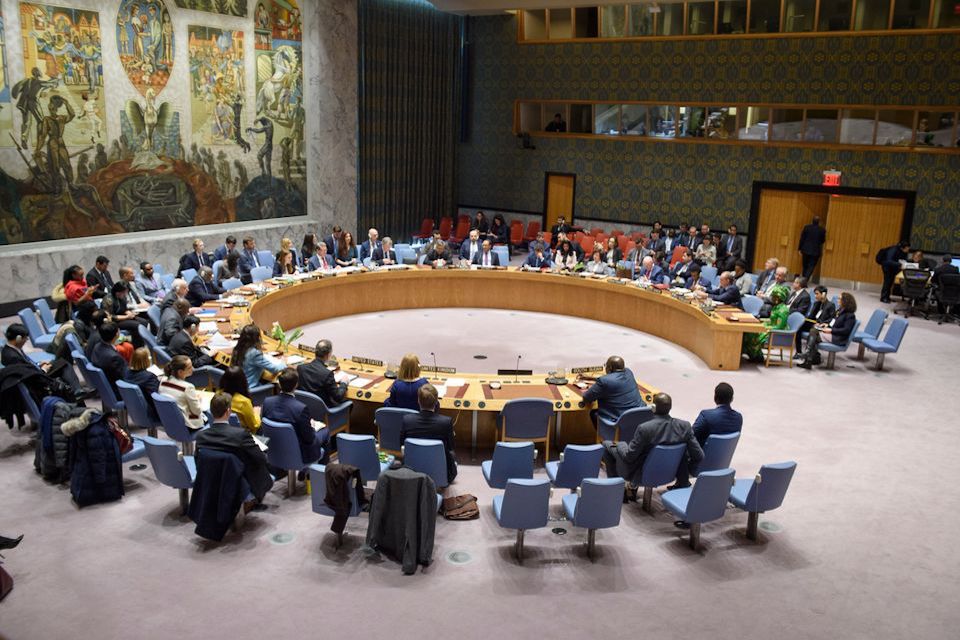A peaceful, inclusive and prosperous future for Afghanistan
Statement by Ambassador Karen Pierce, UK Permanent Representative to the UN, at the Security Council briefing on Afghanistan

Thank you very much, Mr President.
I wanted to begin, first of all, by expressing condolences to Tunisia for the death of the President, but also to join other colleagues in condemning the attacks in Kabul and Afghanistan recently. They were very sad reminder of why peace is so essential. Afghanistan has suffered enough from such attacks and we send our deepest condolences and sympathies to the government and to the families of the victims.
Like others, I think it is very good that we are able to have this discussion today. Thank you for scheduling it. And thank you to the Deputy Secretary-General, to Rosemary Di Carlo, and to Ms Afghani from WILPF. I have seen for myself, when in Afghanistan, the very good work that WILPF does, and it is good to be able to hear more about it today. And it was excellent, Deputy Secretary-General, that you were able to visit yourself. You will forgive me for saying so, particularly with a broken leg. So I mean, that takes a lot of guts and organisation. So thank you very much for doing that. But I think it just underscores the importance of the issue, but also the determination all of us have to help Afghanistan and try and move this really important agenda forward. And I can confirm that, as the Deputy Secretary-General said, the EU and the UN will increase our efforts to fight violence against women in Afghanistan through the Spotlight Initiative.
When I first arrived in Kabul, it was just after the Farkhunda murder at the mosque, so it has very much been on my mind as an issue that deserves renewed efforts, notwithstanding the excellent work that has taken so far.
We have a Special Envoy for Gender Equality in the UK and she also went to Kabul earlier this month supporting women’s participation in preliminary discussions and the peace process itself. And as others have mentioned, the recent Intra-Afghan Dialogue in Doha, which Germany and Qatar facilitated, was extremely good news: that nearly 25 percent of the non-Taliban participants were women. It is clear there is more that can be done, but that was an encouraging start on which we can build.
We all know that we need a genuine political process in Afghanistan to give all Afghans - I want to stress the word all - the best chance to decide the future of their country. And we really do support very comprehensively the ongoing efforts of the Afghan government and of the United States and in particular, Special Representative Zalmay Khalilzad, who many of us remember when he was PR here.
And I hope that the entire region, as well as the international community, can lend support to inclusive intra-Afghan peace negotiations without delay and with the full involvement of both sides to the conflict. And obviously, in particular, the legitimate government of Afghanistan. And I hope, too, that whenever we see attempts to roll back on women’s rights, we can speak up and we can challenge those. Any political settlement needs to build on the progress made on human rights, and that includes gender equality over the past 18 years. And the Deputy Secretary-General set that out very eloquently.
We, too, have been following elections like many of the speakers this morning. They are crucial for future political stability and inclusion. And in a clear signal of Afghan ownership, we welcome the government’s commitment to finance a significant portion of the election budget. We also urge the Independent Electoral Commission with the support of the relevant Afghan ministries, to continue their work to deliver timely, inclusive and credible elections, working with the Afghan defence and security forces so that the Afghan people can exercise their right to vote safely. And I know from first-hand experience how important elections are to the Afghan people. And I hope we can really give a lot of attention to ensuring full, effective and meaningful participation of women as both voters and candidates.
Elections are a civilian operation. They should not be used as a target. Polling takes place in schools and public places and involves ordinary citizens. And to attack the elections would be an attack on all the Afghan people. So we hope that all political actors will behave responsibly and constructively so the elections can be peaceful as well as inclusive. And in this connection, Mr. President, I might note and welcome the Taliban’s commitment at the Intra-Afghan Dialogue in Doha to refrain from targeting civilians. And we hope they will stand by this promise to their fellow Afghans.
For the UK, Mr President, we remain committed to supporting inclusive peace in Afghanistan. In June, the Afghan Ambassador and I announced the launch of the Group of Friends of Women in Afghanistan. And we will have a formal launch in the autumn. This initiative is designed to complement the UK’s regular engagement with women peace builders across Afghanistan. We recently held consultations on what the Women, Peace and Security agenda means for them and exploring how best to use the upcoming anniversary of 1325 to achieve their goals. We are looking forward to taking the findings of those consultations forward in the coming months in the context of the Afghanistan peace process.
To conclude, Mr President, we remain steadfast in our commitment to support the people and government of Afghanistan in achieving a peaceful, inclusive and prosperous future with equal rights and participation at its core.
Thank you.